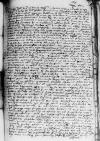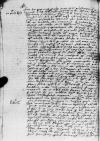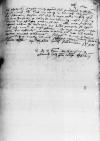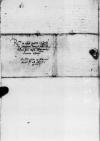Multo iam temporum intervallo et ego, et carissimus nepos vester, dominus Kaspar Hannau (Gasparus Hannovius, Kacper Hannow) (*1519 – †1571), Dantiscus' nephew (son of Anna), doctor of both canon and civil law, friend of Marcin Kromer, Bishop of Ermland; his studies in Cracow (1536-1538), and later in Rome (1539-1548), were financed by his uncle; from 1545 Canon of Ermland (Warmia) and Dean of Guttstadt (Dobre Miasto) Collegiate Chapter; from 1547 Canon of Włocławek (ORACKI 1984, p. 84; KOPICZKO 2, p. 108-109)⌊GasparKaspar Hannau (Gasparus Hannovius, Kacper Hannow) (*1519 – †1571), Dantiscus' nephew (son of Anna), doctor of both canon and civil law, friend of Marcin Kromer, Bishop of Ermland; his studies in Cracow (1536-1538), and later in Rome (1539-1548), were financed by his uncle; from 1545 Canon of Ermland (Warmia) and Dean of Guttstadt (Dobre Miasto) Collegiate Chapter; from 1547 Canon of Włocławek (ORACKI 1984, p. 84; KOPICZKO 2, p. 108-109)⌋, privati sumus solaciosissimis litteris vestris, credimus tamen, prout a Deo incessanter, impetrare. Contendimus, quod Reverendissima Dominatio Vestra sana sit et in Domino semper confortata, ut Ermland (Warmia, Varmia), diocese and ecclesiastical principality in northeastern Poland, 1466-1772 within the Kingdom of Poland, Royal Prussia⌊ ecclesiae suaeErmland (Warmia, Varmia), diocese and ecclesiastical principality in northeastern Poland, 1466-1772 within the Kingdom of Poland, Royal Prussia⌋ in hoc tempore tribulationis quietius, quoad fieri possit, praesideat et succurrat.
Scripsi cf. Olaus MAGNUS to Ioannes DANTISCUS Trent, 1545-12-13, CIDTC IDL 2889⌊aliascf. Olaus MAGNUS to Ioannes DANTISCUS Trent, 1545-12-13, CIDTC IDL 2889⌋ die XIII Decembris, qualiter tot annis infinitorum hominum singultibus et lacrimis, summa servata devotione, totius cleri et populi applausu on the margin⌈applausuapplausu on the margin⌉ ad honorem Dei et consolationem afflictae ecclesiae generale oecumenicum concilium Tridentinum mandato sacratissimi domini nostri Paul III (Alessandro Farnese) (*1468 – †1549), 1493 elevated to cardinal; 1524 Cardinal-Bishop of Ostia; 1534-1549 Pope⌊papaePaul III (Alessandro Farnese) (*1468 – †1549), 1493 elevated to cardinal; 1524 Cardinal-Bishop of Ostia; 1534-1549 Pope⌋, praesentia multorum episcoporum ac praelatorum, comitum et baronum ac religiosorum aperiebatur. Post quam apertionem fuerant plurimae congregationes super rebus magis necessariis statuendis in secunda sessione, quae facta est 4-a Februarii in ecclesia cathedrali Trent (Tridentum), city in northern Italy, Trentino-Alto Adige (Südtirol)⌊huius civitatisTrent (Tridentum), city in northern Italy, Trentino-Alto Adige (Südtirol)⌋, decretumque more veterum conciliorum lectum et definitum est, ut a symbolo fidei secundum apostolicam confessionem sumeretur initium, quia de illa primitus loquendum tractandumque erit, unde scripturarum deprivatio calumniandi suscepit exordium.
Modus etiam tractandi specialior annexus est, ut de fide iam dicta ac moribus fluctuantis ecclesiae alternative tractandum erit, simulque decreto adiunctum fuit, ut praesules in via constituti ab Holy See (Sedes Apostolica) ⌊UrbeHoly See (Sedes Apostolica) ⌋, Spain (Hispania)⌊HispaniaSpain (Hispania)⌋, France (Gallia, Francia), the kingdom⌊GalliaFrance (Gallia, Francia), the kingdom⌋, Portugal⌊PortugaliaPortugal⌋ ac aliis regionibus exspectentur, ita ut 3-a sessio fieri commodius poterit die Iovis proxime post dominicam Laetare proxime venturam. Sequentibus tamen diebus ex conclusione congregatorum episcoporum conceptae sunt et decretae litterae ad Paul III (Alessandro Farnese) (*1468 – †1549), 1493 elevated to cardinal; 1524 Cardinal-Bishop of Ostia; 1534-1549 Pope⌊sanctissimum dominumPaul III (Alessandro Farnese) (*1468 – †1549), 1493 elevated to cardinal; 1524 Cardinal-Bishop of Ostia; 1534-1549 Pope⌋ nostrum, Charles V of Habsburg (*1500 – †1558), ruler of the Burgundian territories (1506-1555), King of Spain as Charles I (1516-1556), King of Naples and Sicily, King of the Romans (1519-1530), Holy Roman Emperor of the German Nation (elected 1519, crowned 1530, abdicated 1556); son of Philip I the Handsome and Joanna the Mad of Castile⌊imperatoremCharles V of Habsburg (*1500 – †1558), ruler of the Burgundian territories (1506-1555), King of Spain as Charles I (1516-1556), King of Naples and Sicily, King of the Romans (1519-1530), Holy Roman Emperor of the German Nation (elected 1519, crowned 1530, abdicated 1556); son of Philip I the Handsome and Joanna the Mad of Castile⌋, Francis I of Valois (*1494 – †1547), 1515-1547 King of France; son of Charles, Count of Angoulême, and Louise of Savoy
Ferdinand I of Habsburg (*1503 – †1564), from 1521 Archduke of Austria, from 1526 King of Bohemia and Hungary, Croatia and Slavonia as Ferdinand I, 1531-1558 King of the Romans, 1558-1564 Holy Roman Emperor; son of Philip I the Handsome and Joanna the Mad of Castile, a younger brother of Charles V of Habsburg
John III of Portugal (John the Pious, João III Aviz) (*1502 – †1557), 1521-1557 King of Portugal; son of Manuel I, King of Portugal, and Maria of Aragon
Sigismund I Jagiellon (Zygmunt I) (*1467 – †1548), King of Poland and Grand Duke of Lithuania (1506-1548); Duke of Głogów (Glogau) (1499-1506), Duke of Opava (1501-1506), Governor of Silesia (1504-1506); son of King Kazimierz IV Jagiellon and Elisabeth of Austria⌊reges Franciae, Romanorum, Portugaliae, PoloniaeFrancis I of Valois (*1494 – †1547), 1515-1547 King of France; son of Charles, Count of Angoulême, and Louise of Savoy
Ferdinand I of Habsburg (*1503 – †1564), from 1521 Archduke of Austria, from 1526 King of Bohemia and Hungary, Croatia and Slavonia as Ferdinand I, 1531-1558 King of the Romans, 1558-1564 Holy Roman Emperor; son of Philip I the Handsome and Joanna the Mad of Castile, a younger brother of Charles V of Habsburg
John III of Portugal (John the Pious, João III Aviz) (*1502 – †1557), 1521-1557 King of Portugal; son of Manuel I, King of Portugal, and Maria of Aragon
Sigismund I Jagiellon (Zygmunt I) (*1467 – †1548), King of Poland and Grand Duke of Lithuania (1506-1548); Duke of Głogów (Glogau) (1499-1506), Duke of Opava (1501-1506), Governor of Silesia (1504-1506); son of King Kazimierz IV Jagiellon and Elisabeth of Austria⌋ etc. transmittendae on the margin⌈transmittendaetransmittendae on the margin⌉, ut faveant et succurrant iustis et honestis ac utilibus decretis sacrosancti concilii (etiam ad duces potentiores, qui Romanum non recognoscunt imperium). De Henry VIII Tudor (*1491 – †1547), 1509-1547 King of England; son of Henry VII Tudor and Elizabeth of York⌊rege AngliaeHenry VIII Tudor (*1491 – †1547), 1509-1547 King of England; son of Henry VII Tudor and Elizabeth of York⌋ ac aliis catholicae ac apostolicae ecclesiae malitiose rebellantibus calix reservatur in aliud tempus. Necesse enim est, ut non minus de exsecutione legum attendatur quam de publicatione, immo in nostro casu diligentior respectus est habendus.
Sed nec est dubitandum, quin ex colloquio atque eius exitu (quod in Regensburg (Ratisbona), city in southeastern Germany, Bavaria, on the Danube river⌊RatisbonaRegensburg (Ratisbona), city in southeastern Germany, Bavaria, on the Danube river⌋ nunc habetur) magna pars rei bene determinandae dependet (protestantes nacti occasionem ex adventu Nicolas Perrenot de Granvelle (*1484 – †1550), doctor of both canon and civil law, one of the most trusted advisors of Emperor Charles V, in 1519 entered the service of Charles V, in 1521 took part in the Habsburg-French negotiations in Calais, in 1529 in peace negotiations with the Roman Curia and the Italian states, and later, in 1538, in the conference of Nice between Charles V and Francis I; prominent official and advisor of Charles V and of Margaret of Austria in the administration of the County of Burgundy and of the Habsburg Netherlands, collaborator of Chancellor Gattinara, 1530 secretary of State for German and Netherlandish affairs and Chancellor of the Kingdom of Sicily and Naples (he replaced Gattinara after his death in the position of Grand Chancellor, although not using the title); imperial envoy to France (several times up to 1528) (CE, vol. 3, p. 68-70; DURME 1964; ANTONY 2006)⌊GranveliNicolas Perrenot de Granvelle (*1484 – †1550), doctor of both canon and civil law, one of the most trusted advisors of Emperor Charles V, in 1519 entered the service of Charles V, in 1521 took part in the Habsburg-French negotiations in Calais, in 1529 in peace negotiations with the Roman Curia and the Italian states, and later, in 1538, in the conference of Nice between Charles V and Francis I; prominent official and advisor of Charles V and of Margaret of Austria in the administration of the County of Burgundy and of the Habsburg Netherlands, collaborator of Chancellor Gattinara, 1530 secretary of State for German and Netherlandish affairs and Chancellor of the Kingdom of Sicily and Naples (he replaced Gattinara after his death in the position of Grand Chancellor, although not using the title); imperial envoy to France (several times up to 1528) (CE, vol. 3, p. 68-70; DURME 1964; ANTONY 2006)⌋ flabello seditionum solita turbatione nituntur eum instructum vel induratum facere, ut Charles V of Habsburg (*1500 – †1558), ruler of the Burgundian territories (1506-1555), King of Spain as Charles I (1516-1556), King of Naples and Sicily, King of the Romans (1519-1530), Holy Roman Emperor of the German Nation (elected 1519, crowned 1530, abdicated 1556); son of Philip I the Handsome and Joanna the Mad of Castile⌊caesareae maiestatiCharles V of Habsburg (*1500 – †1558), ruler of the Burgundian territories (1506-1555), King of Spain as Charles I (1516-1556), King of Naples and Sicily, King of the Romans (1519-1530), Holy Roman Emperor of the German Nation (elected 1519, crowned 1530, abdicated 1556); son of Philip I the Handsome and Joanna the Mad of Castile⌋ persuadeat dogmata eorum virulenta sic, ut divulgata sunt, omnino fore confirmanda, immo quod in nullo puncto respectus fiat ad hoc concilium generale, ubi asserunt solos papistas, hypocritas et id genus fore congregatos on the margin⌈fore congregatosfore congregatos on the margin⌉ ad Christianum evangelium, quod illi reduxerant subvertendum. Sed quam calumniose haec loquentur polluto ore, nemo sanae mentis ignorat, sunt enim hic viri doctissimi ac piissimi, qui hac modestia usi semper Deum orant pro errantibus, ut convertantur et vivant. Si adversarii maledicunt, faciunt, quod spiritus eorum suggerit, nos benedicimus et pro peccatis emendam promittimus et gratiam, ut eam impleamus, impetrare contendimus.
Sunt hic insignissimi theologi ex Spain (Hispania)⌊HispaniaSpain (Hispania)⌋, France (Gallia, Francia), the kingdom⌊GalliaFrance (Gallia, Francia), the kingdom⌋, Italy (Italia)⌊ItaliaItaly (Italia)⌋ etc., item philosophi omnium opinione doctissimi, iuris periti stipendio liberalissimo Charles V of Habsburg (*1500 – †1558), ruler of the Burgundian territories (1506-1555), King of Spain as Charles I (1516-1556), King of Naples and Sicily, King of the Romans (1519-1530), Holy Roman Emperor of the German Nation (elected 1519, crowned 1530, abdicated 1556); son of Philip I the Handsome and Joanna the Mad of Castile⌊caesareae maiestatisCharles V of Habsburg (*1500 – †1558), ruler of the Burgundian territories (1506-1555), King of Spain as Charles I (1516-1556), King of Naples and Sicily, King of the Romans (1519-1530), Holy Roman Emperor of the German Nation (elected 1519, crowned 1530, abdicated 1556); son of Philip I the Handsome and Joanna the Mad of Castile⌋ huc destinati, praeterea privati religiosi diversorum ordinum magno numero, quibus consultiva vox reverenter committitur veluti solis episcopis definitiva in sessione, abbates etiam sunt hic plures magnae eruditionis in litteris sacris ita, ut me arbitror beatum, dum perspicio written over a⌈aoo written over a⌉m in ... illegible⌈...... illegible⌉ generali{s} congregatione singulorum vota audiri written over e⌈eii written over e⌉ contemplarique posse ... illegible⌈...... illegible⌉ secundum distincta adscribed⌈distinctadistincta adscribed⌉ Domini gratiarum.
 BK, 230, p. 160
BK, 230, p. 160
Fuit hic proximis diebus ante diem Purificationis Divae Virginis quidam episcopus, pater Paulus Vergerius on the margin⌈pater Pier Paolo Vergerio (*1498 – †1565), theologian and writer; accused of heresy by the Inquisition, in 1549 he left Italy and joined the Reformation; 1533 papal nuncio to Roman King Ferdinand I and envoy to the Colloquy of Worms and Regensburg (1540, 1541); 1536 Bishop of Modruš; 1536-1549 - of Capodistria⌊Paulus VergeriusPier Paolo Vergerio (*1498 – †1565), theologian and writer; accused of heresy by the Inquisition, in 1549 he left Italy and joined the Reformation; 1533 papal nuncio to Roman King Ferdinand I and envoy to the Colloquy of Worms and Regensburg (1540, 1541); 1536 Bishop of Modruš; 1536-1549 - of Capodistria⌋pater Paulus Vergerius on the margin⌉ Iustinopolitanus de Istria, offerens suam praesentiam et oboedientiam reverendissimis dominis legatis ad interessendum(!) et consultandum etc. Sed quia aliter visus est trahere rete, quam a supremo piscatore institutum est, indultum seu iniunctum est illi, ut recedendo sibi parceret a laboribus suis et ita celerius ad Ercole Gonzaga (*1505 – †1563), son of Giovanni Francesco Gonzaga, nephew of Cardinal Sigismondo Gonzaga; studied philosophy (under Pietro Pomponazzi) and theology; committed to the reform of the catholic Church; 1521 - appointed Bishop of Mantua, 1527 - elevated to Cardinal⌊cardinalem suum MantuanumErcole Gonzaga (*1505 – †1563), son of Giovanni Francesco Gonzaga, nephew of Cardinal Sigismondo Gonzaga; studied philosophy (under Pietro Pomponazzi) and theology; committed to the reform of the catholic Church; 1521 - appointed Bishop of Mantua, 1527 - elevated to Cardinal⌋ recessit, quam ad concilium accessit. Imputabatur Ercole Gonzaga (*1505 – †1563), son of Giovanni Francesco Gonzaga, nephew of Cardinal Sigismondo Gonzaga; studied philosophy (under Pietro Pomponazzi) and theology; committed to the reform of the catholic Church; 1521 - appointed Bishop of Mantua, 1527 - elevated to Cardinal⌊illiErcole Gonzaga (*1505 – †1563), son of Giovanni Francesco Gonzaga, nephew of Cardinal Sigismondo Gonzaga; studied philosophy (under Pietro Pomponazzi) and theology; committed to the reform of the catholic Church; 1521 - appointed Bishop of Mantua, 1527 - elevated to Cardinal⌋ dixisse sanctum Christophorum non portasse per flumen puerulum Salvatorem nostrum neque sanctum Georgium hasta vel pica punxisse draconem etc. Secretior tamen est impostura, sive crimen Ercole Gonzaga (*1505 – †1563), son of Giovanni Francesco Gonzaga, nephew of Cardinal Sigismondo Gonzaga; studied philosophy (under Pietro Pomponazzi) and theology; committed to the reform of the catholic Church; 1521 - appointed Bishop of Mantua, 1527 - elevated to Cardinal⌊illiErcole Gonzaga (*1505 – †1563), son of Giovanni Francesco Gonzaga, nephew of Cardinal Sigismondo Gonzaga; studied philosophy (under Pietro Pomponazzi) and theology; committed to the reform of the catholic Church; 1521 - appointed Bishop of Mantua, 1527 - elevated to Cardinal⌋ impingitur, quod adversus Solem spuere solet et Mercurium eius etc. Oretis intime Deum pro nobis, ne inter nos assit Sathan. Tempus enim instat, quo benedictum Salvatorem nostrum in solitudine aggressus written over m⌈mss written over m⌉ est crudelibus temptamentis, nostrum vero tempus semper suspectum est, quo expetat nos, ut cribret sicut triticum. Spero tamen secundum Christi Dei miserationem, quod nihil conamine suo maligno contra nos perficiet etc.
Ad finem huius Februarii venturi sunt oratores Charles V of Habsburg (*1500 – †1558), ruler of the Burgundian territories (1506-1555), King of Spain as Charles I (1516-1556), King of Naples and Sicily, King of the Romans (1519-1530), Holy Roman Emperor of the German Nation (elected 1519, crowned 1530, abdicated 1556); son of Philip I the Handsome and Joanna the Mad of Castile⌊caesareae maiestatisCharles V of Habsburg (*1500 – †1558), ruler of the Burgundian territories (1506-1555), King of Spain as Charles I (1516-1556), King of Naples and Sicily, King of the Romans (1519-1530), Holy Roman Emperor of the German Nation (elected 1519, crowned 1530, abdicated 1556); son of Philip I the Handsome and Joanna the Mad of Castile⌋, Francis I of Valois (*1494 – †1547), 1515-1547 King of France; son of Charles, Count of Angoulême, and Louise of Savoy⌊regis GalliaeFrancis I of Valois (*1494 – †1547), 1515-1547 King of France; son of Charles, Count of Angoulême, and Louise of Savoy⌋, Ferdinand I of Habsburg (*1503 – †1564), from 1521 Archduke of Austria, from 1526 King of Bohemia and Hungary, Croatia and Slavonia as Ferdinand I, 1531-1558 King of the Romans, 1558-1564 Holy Roman Emperor; son of Philip I the Handsome and Joanna the Mad of Castile, a younger brother of Charles V of Habsburg⌊FerdinandiFerdinand I of Habsburg (*1503 – †1564), from 1521 Archduke of Austria, from 1526 King of Bohemia and Hungary, Croatia and Slavonia as Ferdinand I, 1531-1558 King of the Romans, 1558-1564 Holy Roman Emperor; son of Philip I the Handsome and Joanna the Mad of Castile, a younger brother of Charles V of Habsburg⌋, John III of Portugal (John the Pious, João III Aviz) (*1502 – †1557), 1521-1557 King of Portugal; son of Manuel I, King of Portugal, and Maria of Aragon⌊PortugaliaeJohn III of Portugal (John the Pious, João III Aviz) (*1502 – †1557), 1521-1557 King of Portugal; son of Manuel I, King of Portugal, and Maria of Aragon⌋ et forsan Sigismund I Jagiellon (Zygmunt I) (*1467 – †1548), King of Poland and Grand Duke of Lithuania (1506-1548); Duke of Głogów (Glogau) (1499-1506), Duke of Opava (1501-1506), Governor of Silesia (1504-1506); son of King Kazimierz IV Jagiellon and Elisabeth of Austria⌊PoloniaeSigismund I Jagiellon (Zygmunt I) (*1467 – †1548), King of Poland and Grand Duke of Lithuania (1506-1548); Duke of Głogów (Glogau) (1499-1506), Duke of Opava (1501-1506), Governor of Silesia (1504-1506); son of King Kazimierz IV Jagiellon and Elisabeth of Austria⌋, in quorum numero vel principalem esse putant Dominationem Vestram Reverendissimam, vel ipsam solam. Amici vestri, praesertim Christoforo Madruzzo ⌊cardinalis TridentinusChristoforo Madruzzo ⌋, qui semper a me interrogant, quomodo valetis, sermonem continuando “Utinam tantus vir ad nos accederet pro amore religionis, sicuti multas arduas legationes subierat pro caducis(?) huius orbis causis”. Sunt et alii, de quibus alias satis scripsi, qui praesentiam Reverendissimae Dominationis Vestrae summo voto desiderant. Quod si Reverendissima Dominatio Vestra venire nequeat, saltem scribat consilium et instructionem, quomodo et quid Ei videtur circa reductionem errantis Germany (Germania, Niemcy)⌊GermaniaeGermany (Germania, Niemcy)⌋ aliarumque nationum. Ita et video alios facere missis litteris suis, sed non nisi hi(!), qui videntur apud Deum et homines excusabiles irrefragabili ratione.
De negotiis regnorum aquilonarium(!) me quantocius informet Reverendissima Dominatio Vestra, praesertim si aliqua surrexerit mutatio in Sweden (Suecia)⌊regno patriae meaeSweden (Suecia)⌋ repentina.
De canonicatu Lubicensi on the margin⌈LubicensiLubicensi on the margin⌉ secundum breve apostolicum Paternitati Vestrae alias missum, quid actum sit, summopere cupio imformari.
De Kaspar Hannau (Gasparus Hannovius, Kacper Hannow) (*1519 – †1571), Dantiscus' nephew (son of Anna), doctor of both canon and civil law, friend of Marcin Kromer, Bishop of Ermland; his studies in Cracow (1536-1538), and later in Rome (1539-1548), were financed by his uncle; from 1545 Canon of Ermland (Warmia) and Dean of Guttstadt (Dobre Miasto) Collegiate Chapter; from 1547 Canon of Włocławek (ORACKI 1984, p. 84; KOPICZKO 2, p. 108-109)⌊nepoteKaspar Hannau (Gasparus Hannovius, Kacper Hannow) (*1519 – †1571), Dantiscus' nephew (son of Anna), doctor of both canon and civil law, friend of Marcin Kromer, Bishop of Ermland; his studies in Cracow (1536-1538), and later in Rome (1539-1548), were financed by his uncle; from 1545 Canon of Ermland (Warmia) and Dean of Guttstadt (Dobre Miasto) Collegiate Chapter; from 1547 Canon of Włocławek (ORACKI 1984, p. 84; KOPICZKO 2, p. 108-109)⌋ Reverendissimae Dominationis Vestrae heri accepi litteras, quod bene valet, plurimum impeditus propter oratorem regiae maiestatis, qui die Trium Regum Rome (Roma), city in central Italy, on the Tiber river, seat of the Holy See⌊UrbemRome (Roma), city in central Italy, on the Tiber river, seat of the Holy See⌋ est ingressus. De Alexander Sculteti (Scholtcze) (*ca. 1485 – †1570), doctor of canon law, cartographer, historian and friend of Copernicus; accused by Dantiscus and Stanisław Hozjusz (Hosius) of Sacramentarian heresy, in 1540 banished by King Sigismund I Jagiellon; in 1541 imprisoned by the Inquisition in Rome; after release from prison in 1544 he stayed in Rome for the rest of his life; 1509-1516 notary at the Roman Curia; 1519-1541 Canon of Ermland (Warmia), 1530-1539 Chancellor of the Ermland Chapter; 1536-1538 administrator of the komornictwo of Mehlsack (Melzak, today Pieniężno) (KOPICZKO 2, p. 299; SBKW, p. 219-220)⌊ScultetiAlexander Sculteti (Scholtcze) (*ca. 1485 – †1570), doctor of canon law, cartographer, historian and friend of Copernicus; accused by Dantiscus and Stanisław Hozjusz (Hosius) of Sacramentarian heresy, in 1540 banished by King Sigismund I Jagiellon; in 1541 imprisoned by the Inquisition in Rome; after release from prison in 1544 he stayed in Rome for the rest of his life; 1509-1516 notary at the Roman Curia; 1519-1541 Canon of Ermland (Warmia), 1530-1539 Chancellor of the Ermland Chapter; 1536-1538 administrator of the komornictwo of Mehlsack (Melzak, today Pieniężno) (KOPICZKO 2, p. 299; SBKW, p. 219-220)⌋ causa sperat se bonam suscepturum determinationem. Mikołaj Loka (Mikołaj Lok) (†1569), collaborator of Stanisław Hozjusz as a royal secretary; in 1545-1547 he stayed in Rome; 1540 Ermland canon; 1547 - Poznań; 1560 abbot of the Cistercian monastery in Oliwa; 1550 envoy to the Prussian diet on behalf of King Sigismund II August (SZORC 1990, p. 331; KOPICZKO 2, p. 201)⌊LockaMikołaj Loka (Mikołaj Lok) (†1569), collaborator of Stanisław Hozjusz as a royal secretary; in 1545-1547 he stayed in Rome; 1540 Ermland canon; 1547 - Poznań; 1560 abbot of the Cistercian monastery in Oliwa; 1550 envoy to the Prussian diet on behalf of King Sigismund II August (SZORC 1990, p. 331; KOPICZKO 2, p. 201)⌋ bene valet, a guardia papae propter periculosam societatem honeste servatus, manet in domo sanctae Brigidae prope campum Florem(?) cum quodam honestissimo viro, domino Nicolao Cano Lincopensi, in Sweden (Suecia)⌊SueciaSweden (Suecia)⌋ eiusdem domus seu hospitalis rectore, et in eius expensis, libenter adimam(?) illi hanc quietem ob respectum Reverendissimae Dominationis Vestrae, cui hunc hominem probum deditissimum dudum agnovi.
 BK, 230, p. 161
BK, 230, p. 161
Claude Dodieu de Vély (Claudius Dodeus) (†1558), French diplomat; French diplomat, 1536 ambassador in Rome and envoy of King Francis I to Emperor Charles V, 1537 Master of Requests and councillor to Francis I, 1540 ambassador in the Habsburg Netherlands, 1541 Bishop of Rennes (DE VOCHT 1961, p. 379, 408)⌊Dominus RhedomensisClaude Dodieu de Vély (Claudius Dodeus) (†1558), French diplomat; French diplomat, 1536 ambassador in Rome and envoy of King Francis I to Emperor Charles V, 1537 Master of Requests and councillor to Francis I, 1540 ambassador in the Habsburg Netherlands, 1541 Bishop of Rennes (DE VOCHT 1961, p. 379, 408)⌋ scripsit mihi optans sese commendatum reddi Reverendissimae Dominationi Vestrae, misi alias litteras eius ad Paternitatem Vestram directas, erit Trent (Tridentum), city in northern Italy, Trentino-Alto Adige (Südtirol)⌊hicTrent (Tridentum), city in northern Italy, Trentino-Alto Adige (Südtirol)⌋ in fine Februarii forsan cum aliis a Francis I of Valois (*1494 – †1547), 1515-1547 King of France; son of Charles, Count of Angoulême, and Louise of Savoy⌊rege GalliaeFrancis I of Valois (*1494 – †1547), 1515-1547 King of France; son of Charles, Count of Angoulême, and Louise of Savoy⌋ mittendis episcopis.
De Heinrich II of Braunschweig-Wolfenbüttel der Jüngere (*1489 – †1568), 1514-1568 Duke of Braunschweig-Lüneburg⌊duce BrusuicensiHeinrich II of Braunschweig-Wolfenbüttel der Jüngere (*1489 – †1568), 1514-1568 Duke of Braunschweig-Lüneburg⌋, quod liberatus sit aut liberandus, nihil habemus. Filius eius, Philipp Magnus von Braunschweig-Wolfenbüttel (*1527 – †1553)⌊dux PhilippusPhilipp Magnus von Braunschweig-Wolfenbüttel (*1527 – †1553)⌋, Padova (Patavium, Padua), city in northern Italy, Veneto, on the Bacchiglione river, 40 km N of Venice⌊PaduaePadova (Patavium, Padua), city in northern Italy, Veneto, on the Bacchiglione river, 40 km N of Venice⌋ studet, nulla certa suspicio apparet adhuc de discordia, quae bellum paritura sit apertum inter Charles V of Habsburg (*1500 – †1558), ruler of the Burgundian territories (1506-1555), King of Spain as Charles I (1516-1556), King of Naples and Sicily, King of the Romans (1519-1530), Holy Roman Emperor of the German Nation (elected 1519, crowned 1530, abdicated 1556); son of Philip I the Handsome and Joanna the Mad of Castile⌊caesaream maiestatemCharles V of Habsburg (*1500 – †1558), ruler of the Burgundian territories (1506-1555), King of Spain as Charles I (1516-1556), King of Naples and Sicily, King of the Romans (1519-1530), Holy Roman Emperor of the German Nation (elected 1519, crowned 1530, abdicated 1556); son of Philip I the Handsome and Joanna the Mad of Castile⌋ et Francis I of Valois (*1494 – †1547), 1515-1547 King of France; son of Charles, Count of Angoulême, and Louise of Savoy⌊regem GalliarumFrancis I of Valois (*1494 – †1547), 1515-1547 King of France; son of Charles, Count of Angoulême, and Louise of Savoy⌋.
De Henry VIII Tudor (*1491 – †1547), 1509-1547 King of England; son of Henry VII Tudor and Elizabeth of York⌊rege Angliae Henry VIII Tudor (*1491 – †1547), 1509-1547 King of England; son of Henry VII Tudor and Elizabeth of York⌋mixta nova huc afferuntur, quomodo videlicet nunc victi, nunc victores populari rumore praedicantur.
Felicissime vivat et valeat Reverendissima Dominatio Vestra meoque nomine salutet carissimam sororem suam etc.




 BK, 230, p. 162
BK, 230, p. 162